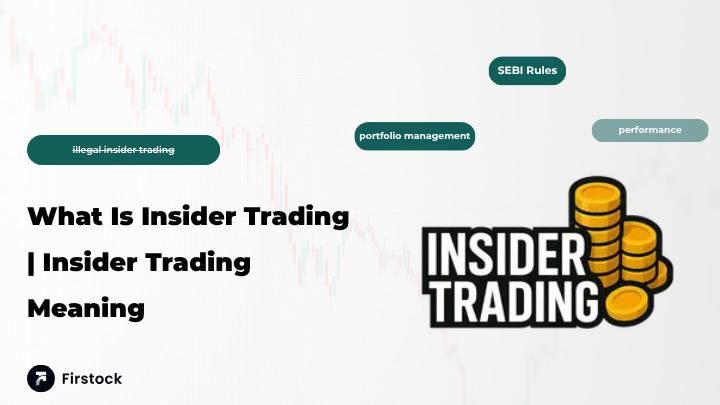Is Insider Trading Legal in India? SEBI Rules Explained

Is Insider Trading Legal in India? A Complete Guide for Everyone
Introduction
Have you ever wondered how some traders seem to know when a stock will rise or fall before everyone else does? It almost feels like magic — but in most cases, it isn’t. It’s something called insider trading. While it may sound like a smart move, it’s actually one of the most serious offences in the financial world when done illegally.
In this article, we’ll break down what is insider trading, how it works, what SEBI’s insider trading regulations say, and answer the big question: “Is insider trading legal in India?”
Learn what is insider trading, insider trading regulations SEBI, is insider trading legal in India, insider trading in India, and use a trading app in India wisely.
What is Insider Trading?
Insider trading refers to buying or selling a company’s securities based on non-public (confidential) information.
Imagine you work at a company and know that it’s about to announce a big merger that will double its stock price. If you buy shares before the news goes public — you’re using inside information for personal gain. That’s insider trading.
It’s like knowing the result of a cricket match before it starts — and then betting on it. It gives you an unfair advantage over others, which is why it’s banned.
How Does Insider Trading Work?
Here’s a simple explanation:
-
A person gets access to unpublished price-sensitive information (UPSI) — meaning details that can affect a company’s stock price but aren’t public yet.
-
That person uses or passes on the information to others (friends, relatives, brokers).
-
They trade (buy or sell) based on this secret knowledge.
Such trades are unfair to other investors and can manipulate stock prices.
Types of Insider Trading
There are two main types of insider trading:
a) Legal Insider Trading
Not all insider trades are illegal. For example, when company directors or employees buy shares of their company and disclose the transaction to SEBI, it’s legal.
Transparency and timely disclosure are the keys.
b) Illegal Insider Trading
When someone trades based on confidential, price-sensitive information without disclosure, it’s illegal.
Examples of Insider Trading in India
India has seen several insider trading cases that shook the markets.
-
Case 1: Hindustan Lever and Brooke Bond (1996) – Hindustan Lever bought shares of Brooke Bond before a merger announcement, leading SEBI to investigate.
-
Case 2: Reliance Industries (2007) – SEBI accused the company of insider trading related to Reliance Petroleum shares.
-
Case 3: Infosys Employee Case (2017) – An employee leaked financial results before they went public.
These examples show that SEBI keeps a close watch on suspicious trading activity.
Why Is Insider Trading Considered Wrong?
Insider trading destroys trust in the stock market.
Think of it like a classroom exam — if one student has the answer key beforehand, is it fair to others? Of course not. Similarly, markets depend on fairness and transparency.
When insiders cheat, it hurts investors, distorts prices, and reduces confidence in the financial system.
Insider Trading Regulations by SEBI
The Securities and Exchange Board of India (SEBI) is the watchdog that regulates the Indian stock market.
To prevent insider trading, SEBI introduced:
-
SEBI (Prohibition of Insider Trading) Regulations, 1992 – the first major law.
-
Updated by SEBI (Prohibition of Insider Trading) Regulations, 2015 – which clarified definitions, penalties, and procedures.
These regulations make it mandatory for companies and insiders to maintain transparency in all market-related information.
What SEBI Defines as an Insider
According to SEBI, an insider is anyone who:
-
Is connected to the company (employees, directors, auditors, consultants, etc.), or
-
Has access to unpublished price-sensitive information (UPSI).
Even relatives or friends who receive such information indirectly can be considered insiders under SEBI’s regulations.
Legal vs Illegal Insider Trading
Let’s make this clearer:
|
Legal Insider Trading |
Illegal Insider Trading |
|
Done with full disclosure |
Done secretly |
|
Involves public information |
Involves confidential info |
|
Reported to SEBI |
Hidden from SEBI |
|
Promotes transparency |
Damages investor trust |
The difference lies in transparency. If the trade is open and declared, it’s fine. If it’s hidden and based on secrets — it’s illegal.
Is Insider Trading Legal in India?
Here’s the short answer: No, insider trading is illegal in India.
The SEBI (Prohibition of Insider Trading) Regulations, 2015 clearly ban trading based on unpublished price-sensitive information.
However, insider trading is legal only when done with prior disclosure and compliance — for example, when a company’s CEO buys company stock and reports it to SEBI within the required time.
In essence:
Transparency = Legal.
Secrecy = Illegal.
SEBI’s Penalties for Insider Trading
SEBI takes insider trading very seriously. The penalties are strict and can include:
-
Monetary penalties up to ₹25 crore or three times the profit made, whichever is higher.
-
Criminal prosecution with jail terms up to 10 years.
-
Bans from trading or holding directorships in listed companies.
These punishments ensure that no one dares misuse inside information for personal gain.
Famous Insider Trading Cases in India
Let’s look at a few well-known cases:
-
Rakesh Agrawal vs SEBI (2003):
The managing director of ABS Industries was accused of insider trading before a merger with Bayer A.G. -
HDFC Bank Employee Case (2021):
An employee shared confidential data with traders for profit. SEBI imposed fines and banned them from the market. -
Axis Bank Case (2017):
Leaked earnings data led SEBI to tighten its insider trading checks.
Each case reinforced the fact that India’s regulators are serious about market fairness.
How SEBI Detects Insider Trading
SEBI uses advanced data analytics and AI-based systems to track unusual trading patterns.
It compares share price movements with company announcements. If someone traded heavily just before a major news release, SEBI investigates.
Moreover, brokers and trading apps in India are also required to flag suspicious transactions.
Role of Technology and Trading Apps in India
Today, millions use trading apps in India to invest in the stock market. Apps like Zerodha, Groww, and Firstock make trading easy, but they also have strict compliance policies.
Most trading platforms work closely with SEBI and stock exchanges to ensure market integrity.
They monitor accounts for unusual trades, insider activity, or sudden profits that look suspicious.
So, even if someone thinks they can outsmart the system — technology ensures there’s nowhere to hide.
How Investors Can Stay Safe and Compliant
Here are a few simple steps to avoid falling into insider trading traps:
-
Avoid trading on tips that sound too good to be true.
-
Do not share company secrets with others.
-
Use verified trading apps in India that follow SEBI regulations.
-
Disclose all your trades if you’re an employee or insider.
-
Stay updated with SEBI’s guidelines.
Remember — being ethical is always more profitable in the long run.
Conclusion
To sum up, insider trading in India is illegal when it involves confidential, price-sensitive information.
SEBI’s insider trading regulations ensure that every investor, big or small, gets a fair and transparent market.
Think of it this way — the stock market is like a playground. Everyone should play by the same rules. When someone cheats, it ruins the game for everyone else.
So, the next time you hear a “hot tip,” pause and ask yourself: “Is this fair, and is it legal?”
Because in the world of trading, fairness isn’t just a rule — it’s the foundation.
FAQs
1. What is insider trading in simple terms?
Insider trading means buying or selling a company’s stock based on secret, non-public information that can affect the stock price.
2. Is insider trading legal in India?
No, insider trading is illegal in India under SEBI regulations unless the information used is public and the trade is fully disclosed.
3. What are insider trading regulations by SEBI?
SEBI’s 2015 regulations prohibit trading based on unpublished price-sensitive information and require transparency from insiders and companies.
4. Can company employees trade company shares legally?
Yes, but only after disclosing the transaction to SEBI and ensuring it does not involve unpublished price-sensitive information.
5. How does SEBI detect insider trading?
SEBI uses data analytics, AI tools, and market surveillance to detect suspicious trades before major announcements or news events.






